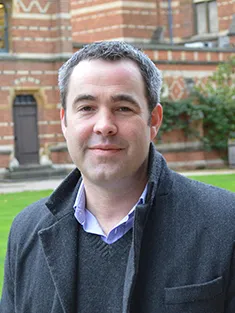Winner: 2023 Organic Chemistry mid-career Prize: Merck, Sharp and Dohme Prize
Professor Stephen Fletcher
University of Oxford
For the development of asymmetric Suzuki-Miyaura-type and other catalytic cross-coupling reactions with racemic starting materials.

Cross-coupling reactions are a key component of organic chemistry which have found widespread use in both academia and industry. Professor Fletcher’s research group are working on new variations of cross-coupling reactions to make complex molecules that are not readily available via other synthetic methods, and to improve the efficiency of the synthesis of molecules which are of interest for their structural or biological properties. They can then be tested for biological activity and, for example, their potential in drug discovery.
Biography
Stephen Fletcher is Professor of Chemistry at the University of Oxford and Fellow and Tutor at Keble College. Originally from Nova Scotia, Canada, Steve is married with two boys, age 7 and 5. He attended Mount Allison University in New Brunswick where he received a BSc (First Class Honours) and worked with Professors Richard Langler and Stephen Westcott. Steve obtained his PhD from the University of Alberta, supervised by Derrick Clive in the area of organic synthesis. He was a NSERC of Canada Postdoctoral Fellow in Ben Feringa’s group at the University of Groningen in the Netherlands before moving to Manchester in the UK to work with Jonathan Clayden. His research interests include asymmetric catalysis, the origins of life, dynamic systems and molecular machines.
Q&A with Professor Stephen Fletcher
How did you first become interested in chemistry?
I didn't study chemistry at grade 12 (equivalent to A-level) in high school, as I was not interested, but had to take it as part of a first year university level course in physics. I was a bit worried about failing as most students had taken it at more advanced levels and so I studied. After doing well, I decided to give it another chance in 2nd year, and took organic chemistry, which I enjoyed as the focus on structure and reactivity was completely different than all the other subjects I had ever taken.
Tell us about somebody who has inspired or mentored you in your career.
Professor Richard Langler was my organic chemistry instructor at Mount Allison University, which is a small undergraduate university. He had an incredibly dry sense of humour and published over 100 papers, most of those on organosulfur chemistry where the work was done by undergraduate researchers working 7pm to midnight on Fridays – afterwards he'd take us out for pizza or something, and we'd get all kinds of looks because we usually smelled quite bad. Before he died in 2014, he was writing an organic chemistry textbook in Esperanto.
What advice would you give to a young person considering a career in chemistry?
Choose a good research problem, and ideally not the same problem that everyone else is going after – unless of course you have a really good idea how to address that problem.
Can you tell us about a scientific development on the horizon that you are excited about?
Although people have been working on synthetic non-equilibrium systems for a while now, there have been some really exciting recent advances, and there are some really good younger research groups looking to make fuel driven systems – and I think it’s going to lead to a lot of tremendously interesting chemistry in the near future.
What does good research culture look like/mean to you?
When people help each other just for the sake of helping each other.
Why do you think teamwork is important in science?
I think teamwork is good in science the same way families are good or having friends is good. It’s just plain good to have people around to share highs and lows with, and to help each other and to bounce ideas off. Plus it is probably a lot more efficient, especially if you can get help with some of the more mundane things, so you can get back to worrying about something interesting.